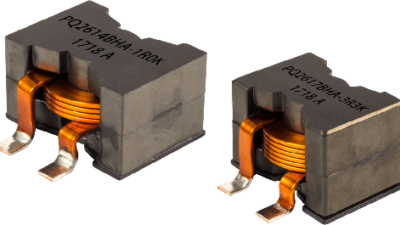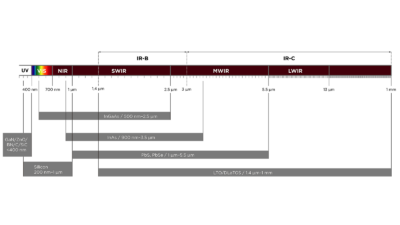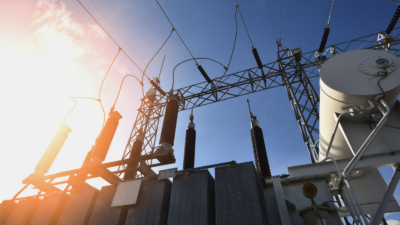Industrial Ethernet is the protocol of choice for faster, more efficient, high-performance production.
TTI has sponsored this post. Written by Greg MacDonald, Amphenol CS.
As we launch into Industry 4.0, the need for advanced automation and high-performance connectivity solutions intensifies, requiring protocols like Industrial Ethernet for maximum efficiency and productivity. Products like ix Industrial and Single Pair Ethernet are ideal new interconnects that offer a compact design and high performance with standardized interfaces.
Automation has become an essential element of most industries today, driving enhanced efficiency and performance. While its initial purpose was to increase productivity and reduce labor costs, today’s industrial automation innovations include artificial intelligence, cloud computing and the Industrial Internet of Things (IIoT) that offer advanced competencies in minimizing error, improving quality and enhancing the manufacturing process.
Companies are starting to take notice and adopting increased automation into the workflow. Back in 2015, a World Economic Forum survey of 250 market leaders found that 88 percent of the participants did not understand the underlying business models and long-term implications of IIoT to their industry. The situation has drastically changed, as a 2022 Industry 4.0 adoption survey by IoT Analytics showed 72 percent of respondents reported that they are in the process of implementing their Industry 4.0/smart factory with many initiatives in progress and some already completed.
Globally, the Industry 4.0 market size is expected to increase from $130.9 billion in 2022 to $377.3 billion by 2029, and that means a skyrocketing need for innovative, robust and reliable interconnect solutions.
Industry 4.0 demands increased speeds and data rates
Continuing increases in demand, quality control requirements, lead-time extensions and cost-reduction requirements are driving the need for more automation, real-time process control, zero-defect manufacturing and efficiency improvements. Behind these rapidly changing requirements are multiple trends in the industrial space, including:
- Industry 4.0 is focused on increased connectivity between devices and equipment on the factory floor and cloud.
- A single protocol, rather than multiple layers with different protocols, streamlines the communication channel between the cloud and the factory floor, creating a seamless connection.
- With a significantly increased number of connected devices, all operating at different speeds, products handling variation and volume will be necessary.
- More devices will require a greater port density to handle the increased connectivity.
- Products need to be rugged and include protection against dust, water and high temperatures.
- Predictive analytics keep teams informed about component service life so preventive maintenance can be scheduled before failure.
- The transition to Industry 4.0 will take time, making it critical to be able to connect new factory automation with heritage (old) equipment.
The Ethernet factory model is superior for streamlining operations
In a traditional factory automation communication system, Ethernet is used at the upper levels, but upon reaching the control network and moving down to the factory floor, that changes. Within that system, there are often multiple networks, protocols and interfaces requiring protocol conversion and gateway equipment to communicate between levels. This adds cost and latency and makes scaling challenging.
This is where Ethernet protocol comes into play. Although there are different types of Ethernet based on operating speed and type of media being used, all versions of Ethernet are compatible with each other. Ethernet is used across a wide variety of industries. Compared to other industries, Ethernet adoption has been relatively slow in the industrial and building automation spaces, primarily due to the lower rate of connectivity within those segments. However, as Industry 4.0 grows, Ethernet is rapidly being adopted as the protocol of choice in industrial automation systems.
In an Ethernet factory model, the same Ethernet protocol is used from the cloud to the factory floor. With a single network, single protocol and common interfaces, protocol conversion is not required, contributing to reduced costs, real-time data speeds and improved scalability. And because every device is addressed, the Ethernet factory model enables a virtual factory (digital twin) setup for running simulations before going live with a test system.

ix Industrial and Single Pair Ethernet provide ideal solutions
For new technology and in Ethernet-connected factories, newer interfaces are providing significant improvements and advantages. Both ix Industrial and the Single Pair Ethernet (SPE) interconnects are ideal for data networks, robotics, automation, edge equipment and other industrial applications. These new interconnects have a compact design and standardized interface for a variety of industrial environments and offer high performance across multiple areas including:
Optimized cabling. The SPE uses two wires, which reduces cable size, weight and cost, and operates at a lower speed for single devices. The ix Industrial has four pairs (eight wires) for higher-speed applications and ten positions with five-pair capability, supporting four-pair Ethernet with two remaining wires that can be used for additional signal or power if needed. The SPE and ix products are easily connectable to the end of a cable.
Signal integrity and shielding. Both SPE and ix meet the insertion and return loss requirements for signal integrity. SPE can achieve 1Gbps to 40 meters (or 10Mbps out to one kilometer) of cable length, while ix is rated at 10Gbps out to 100 meters. Both are also full-metal shielded through the mated pair to ensure protection from radiated emissions to maintain signal integrity.
Electrical. SPE uses power over data line (PoDL), while ix uses power over Ethernet (PoE++), which is the highest power level of the spec. Both interconnects can accommodate more power than what the spec defines, which provides excellent plug-and-play connectivity, making it easy to scale up a factory automation process when adding new devices.
Environmental and mechanical. The SPE has a single metal latch for a strong, durable connection. The ix Industrial has a pair of latches on either side, providing good retention to the mating connector. Both use the IP20 finger-proof design with recessed pins and sockets to ensure safety and protect contacts from damage over a temperature range. IP6X versions are also available. The contact design of both types ensures a long mating life.
Standardization. The standards governing SPE and ix are supported by multiple suppliers, which makes it easy to connect across manufacturers and devices. Particularly as factories adopt new technology, interconnection will become increasingly important. In an industrial control cabinet, for example, there will be multiple connections required, including a programmable logic controller, input/output ports, Ethernet switch, sensor control, power supplies, vision system, controller and relays.
Amphenol and TTI deliver the goods
Amphenol is committed to being one of the premier suppliers offering industrial Ethernet interconnect solutions. With a strong product portfolio that is fully tooled and interchangeable with one another, Amphenol has expanded to keep up with the rapidly growing industrial Ethernet market and has a proven record of being first to market with products for evolving industrial standards and with innovative solutions for the future needs of the industry.
The new ix-MAG connector is a product unique to Amphenol, integrating magnetics into the connector rather than on the PCB, which saves valuable PCB real estate for other components. The ix-MAG maintains the same 10-millimeter spacing as the ix Industrial for increased port density and is also PoE++ compatible. The ix-MAG is available in single port configuration with different plating options.
TTI has established itself as the global distributor of choice, working for more than five decades to deliver the widest and deepest variety of quality electronic components exactly when customers need them with experienced specialists to help them with their design needs. This ensures customers have the latest and highest-performing products and best engineering techniques to maximize their efforts in the challenging new age of Industry 4.0.
To learn more about Amphenol interconnect solutions, visit TTI.



